Clean Fuel Advanced Technology (CFAT) Project Accelerates Fleet Electrification with Plug-and-Play Electric Power Take-Off by Viatec
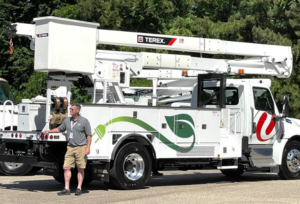 In June 2022, the industry’s first and only production all-electric bucket truck was unveiled at the 68th Electric Utilities Fleet Managers’ Conference. The electric bucket truck’s debut was realized two years earlier than the most optimistic industry projections thanks to a unique collaboration between Viatec, Terex and Navistar/International Trucks.
In June 2022, the industry’s first and only production all-electric bucket truck was unveiled at the 68th Electric Utilities Fleet Managers’ Conference. The electric bucket truck’s debut was realized two years earlier than the most optimistic industry projections thanks to a unique collaboration between Viatec, Terex and Navistar/International Trucks.
Viatec shared that a project of this magnitude required a seamless collaboration between the three critical components of the all-electric bucket truck – an electric chassis, an aerial upfit and the electric power take-off system to power a full day of work. The Terex Optima 55 foot aerial device is powered by a plug-in electric power take-off (PTO) solution by Viatec and mounted on an International® Electric MV™ series chassis from Navistar’s International Trucks.
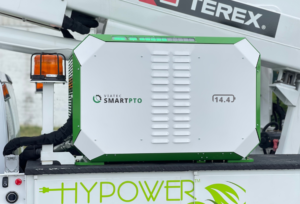 Viatec’s flagship electric PTO (ePTO) product, SmartPTO, is part of their series of zero-emissions worksite solutions for hydraulic powered applications. The SmartPTO’s 2018 pilot program first brought the electric PTO system to North Carolina municipalities after being awarded grant funding from the NC Clean Energy Technology Center’s (NCCETC) Clean Fuel Advanced Technology (CFAT) project.
Viatec’s flagship electric PTO (ePTO) product, SmartPTO, is part of their series of zero-emissions worksite solutions for hydraulic powered applications. The SmartPTO’s 2018 pilot program first brought the electric PTO system to North Carolina municipalities after being awarded grant funding from the NC Clean Energy Technology Center’s (NCCETC) Clean Fuel Advanced Technology (CFAT) project.
“The CFAT project aims to promote and accelerate the adoption of new clean transportation technologies,” said Heather Brutz, Director of the Clean Transportation Program at NCCETC. “With CFAT funds, SmartPTO deployed 24 SmartPTO units in NC municipalities with significant air pollution, including Apex, Winston-Salem, Greensboro, Charlotte, Raleigh, Durham and Cary.” Learn more about 2018 air quality improvement grant projects here.
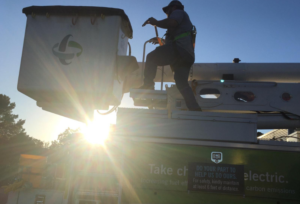 Anjali Deodhar, VP of Sales at Viatec, discussed how the universal plug-and-play solution is helping the entire industry, regardless of which vehicle manufacturer they use, to adopt SmartPTO. “We believe that, for the foreseeable future, utility fleets will be an optimal combination of internal combustion chassis as well as full electric vehicle chassis,” Ms. Deodhar explained, “And the good news is- SmartPTO works as the go-to ePTO solution on both!”
Anjali Deodhar, VP of Sales at Viatec, discussed how the universal plug-and-play solution is helping the entire industry, regardless of which vehicle manufacturer they use, to adopt SmartPTO. “We believe that, for the foreseeable future, utility fleets will be an optimal combination of internal combustion chassis as well as full electric vehicle chassis,” Ms. Deodhar explained, “And the good news is- SmartPTO works as the go-to ePTO solution on both!”
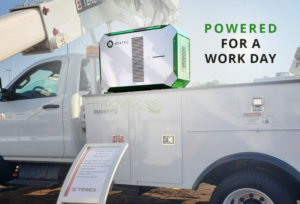
Whether it’s installed on an all-electric chassis or a legacy bucket truck, SmartPTO has the benefits of enhanced safety, reduced maintenance, lower cost of ownership, and social responsibility for electric utility providers. This ePTO is built around an EPA Certified production hardened electric power train and is “Buy America” compliant. The unit is fit for utilities, tree service, sign and light companies and other aerial device applications.
On an electric vehicle (EV) chassis, exhausting a vehicle’s mileage range for the sake of powering worksite equipment is not ideal. Viatec’s SmartPTO can provide all of the power needed for worksite operation so the chassis battery power is reserved for travel and its maximum range is protected. EV’s cut down on fuel usage and reduce both environmental emissions and noise pollution.
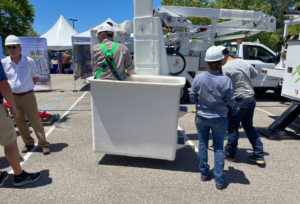 When retrofitted on a diesel bucket truck, the electric PTO allows bucket truck crews to turn off their engine and perform work in a safe, clean and quiet environment, benefiting the owners, operators and the communities in which they work. “Hybrid trucks use their engines about 60 percent less than conventional trucks,” said Ms. Deodhar. “Truck engine maintenance and downtime can be reduced by half annually while extending the life of the vehicle by over 20 percent.”
When retrofitted on a diesel bucket truck, the electric PTO allows bucket truck crews to turn off their engine and perform work in a safe, clean and quiet environment, benefiting the owners, operators and the communities in which they work. “Hybrid trucks use their engines about 60 percent less than conventional trucks,” said Ms. Deodhar. “Truck engine maintenance and downtime can be reduced by half annually while extending the life of the vehicle by over 20 percent.”
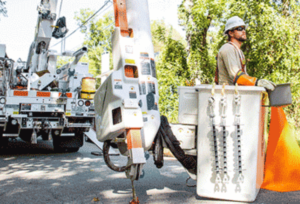 Viatec was able to demonstrate the benefits of SmartPTO to Duke Energy in 2019 thanks to funding from the CFAT project. “By partnering with Duke’s fleet services team and with the support of their senior leadership, we were able to develop, test and deploy systems ready for real-world use,” Ms. Deodhar stated. During Viatec’s collaboration with Duke, they were able to gather feedback, rapidly implement improvements and ultimately produced a superior, production ready ePTO that Duke determined to adopt across their fleet of roughly 600 units over a 5-year period.
Viatec was able to demonstrate the benefits of SmartPTO to Duke Energy in 2019 thanks to funding from the CFAT project. “By partnering with Duke’s fleet services team and with the support of their senior leadership, we were able to develop, test and deploy systems ready for real-world use,” Ms. Deodhar stated. During Viatec’s collaboration with Duke, they were able to gather feedback, rapidly implement improvements and ultimately produced a superior, production ready ePTO that Duke determined to adopt across their fleet of roughly 600 units over a 5-year period.
Investing in any sort of new technology is financially risky for fleets, Ms. Deodhar noted. “CFAT funding greatly reduced the financial risk of both Duke Energy and many NC municipalities, like the Town of Apex, that would have had to shoulder for the initial pilots of these sustainable new products,” she said. The first 24 units deployed through CFAT were funded 80 percent through grant funds and, according to Ms. Deodhar, all of these units are still being used in the field today.
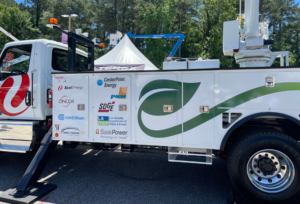 Ms. Deodhar contributed the success of Viatec’s SmartPTO to the active support of their partners Duke Energy, Terex utilities, International Trucks/Navistar, Ultimaster, the South Carolina Research Authority, NCCETC and Zero Motorcycles along with other key individuals who mentored and guided Viatec on this journey. “Collaborations like these are important because every company has a unique strength and our impact is that much greater when we team up to build a more sustainable future together,” Ms. Deodhar said.
Ms. Deodhar contributed the success of Viatec’s SmartPTO to the active support of their partners Duke Energy, Terex utilities, International Trucks/Navistar, Ultimaster, the South Carolina Research Authority, NCCETC and Zero Motorcycles along with other key individuals who mentored and guided Viatec on this journey. “Collaborations like these are important because every company has a unique strength and our impact is that much greater when we team up to build a more sustainable future together,” Ms. Deodhar said.
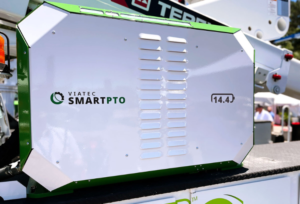 Mark Ferri, Viatec’s President and CEO, is grateful for the support CFAT funding provided in the early stages of developing SmartPTO. “The NC Clean Energy Technology Center’s support made this possible- from presenting at the Clean Cities Coalition meeting where they introduced the CFAT program, assisting with the application process, confirming our Buy America status and managing the funds during the life of the project,” Mr. Ferri stated. “The support, communication, coordination and follow up helped to guarantee our success.”
Mark Ferri, Viatec’s President and CEO, is grateful for the support CFAT funding provided in the early stages of developing SmartPTO. “The NC Clean Energy Technology Center’s support made this possible- from presenting at the Clean Cities Coalition meeting where they introduced the CFAT program, assisting with the application process, confirming our Buy America status and managing the funds during the life of the project,” Mr. Ferri stated. “The support, communication, coordination and follow up helped to guarantee our success.”
The CFAT program, which NCCETC has administered since 2006, aims to reduce transportation-related air pollution emissions by funding public and private organizations projects in 24 eligible North Carolina counties. CFAT is supported with federal Congestion Mitigation Air Quality (CMAQ) funds provided by the NC Department of Transportation (NC DOT). In 2022, $1.5 million in federal funding is being awarded. The 2022 CFAT Request for Proposals was released in May 2022 and applications are due Friday, September 9, 2022.